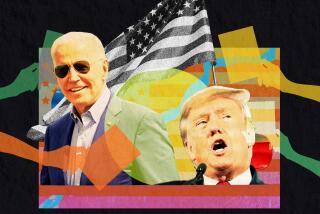Bush-Perot Squabble Boosts Clinton in Poll : Campaign: Democrat leads rivals for first time in ABC-Washington Post survey, but edge is statistically insignificant.
- Share via
WASHINGTON — Arkansas Gov. Bill Clinton’s standing with voters has climbed following recent news reports about Ross Perot and a week of political sniping between the Texas billionaire and President Bush, according to a new Washington Post-ABC News Poll.
The survey found Clinton, the prospective Democratic presidential nominee, with a statistically insignificant 33% to 31% lead over Perot, among registered voters. Bush was the choice of 28% of those questioned.
Among those most likely to vote, Clinton led Perot by 33% to 30%, with Bush favored by 29% of all likely voters.
The new poll marked the first time that Clinton has led Bush and Perot in a Post-ABC News survey and the first time Bush has finished third. Results are based on a national random sample of 1,007 adults that included 785 registered voters interviewed by telephone June 24-28. The margin of sampling error overall was plus or minus three percentage points, and for results among registered voters was plus or minus four percentage points. Interviewing was conducted by ICR Survey Research of Media, Pa.
In Post-ABC polling since April, each of the three candidates has finished first at least once--usually by a narrow margin--and each has finished third, a reflection of how lightly held and easily changeable voter preferences are at the early stages of a presidential campaign.
The new Post-ABC poll suggests that Clinton appears to have benefited, at least temporarily, from the political fighting that erupted last week between Perot and Bush.
The clash began after Bush expressed dismay over news reports that Perot had financed investigations in pursuit of derogatory information about several people who have crossed him in his professional and private life, including Bush.
Perot, an independent who has not formally announced his presidential candidacy, denied the allegations last week in a televised news conference. He then pointedly charged that he was the victim of an orchestrated attempt by the Republican Party to discredit him by leaking damaging but false accusations about him to the press.
While Bush and Perot battled, Clinton appears to have gained considerable ground, particularly among Democrats who had strayed to Perot.
The new survey suggests that support for Clinton has increased from 26% to 33% in the last three weeks. During that same period, Perot lost five percentage points while Bush continued his downward spiral in Post-ABC polls.
Clinton’s improved showing appears to have come largely from Democrats who had supported Perot. Three weeks ago, not even half, 48%, of those Democrats surveyed said they supported Clinton. In the most recent poll, 56% of all Democrats surveyed said they favored Clinton.
Also three weeks ago, Perot was the choice of 35% of those Democrats questioned. Today, 24% say they favor the Texas businessman, results that suggest that Perot’s attempt to forge a bipartisan, non-ideological coalition to challenge the major-party nominees may be stalling.
The poll also had additional good news for Clinton. Two in three voters said they had heard of Clinton’s economic plan, which he announced last week--and half of those familiar with it said they liked his proposals. About a third expressed disapproval, while the rest did not know enough about it to say.
The recent news coverage of Perot appeared to be hurting him among other key groups of voters. When asked which view was closer to their own, four in 10 registered voters agreed that the more they heard about Perot, the less they liked him. Nearly as many expressed the opposite view.
Those numbers suggest potential trouble for Perot among his core constituency. The survey found that better-educated voters--among his earliest and strongest supporters--were far more likely than others to say the recent news about Perot had raised concerns about him.
Among those voters who had attended college, nearly half, 47%, agreed that their view of Perot had become less favorable as they learned more about him.
More to Read
Get the L.A. Times Politics newsletter
Deeply reported insights into legislation, politics and policy from Sacramento, Washington and beyond. In your inbox twice per week.
You may occasionally receive promotional content from the Los Angeles Times.










